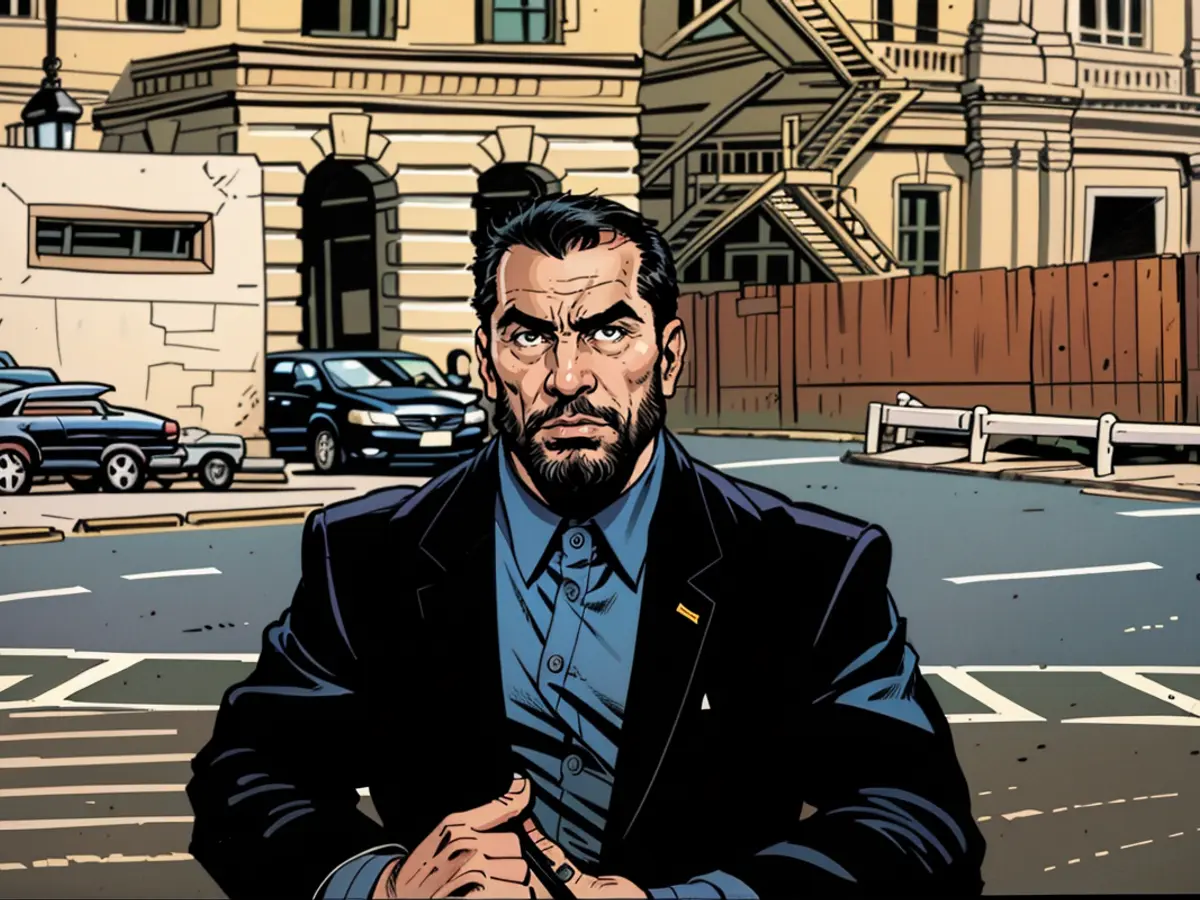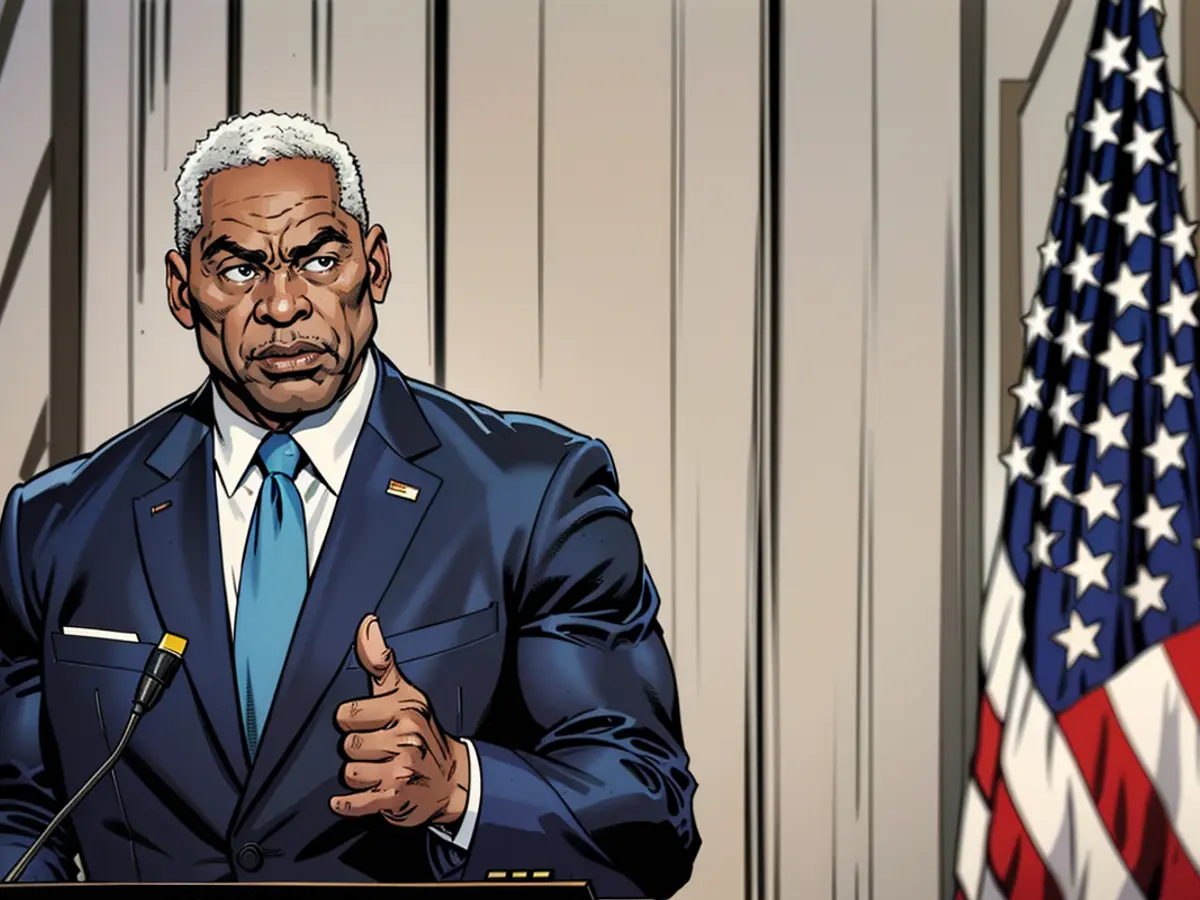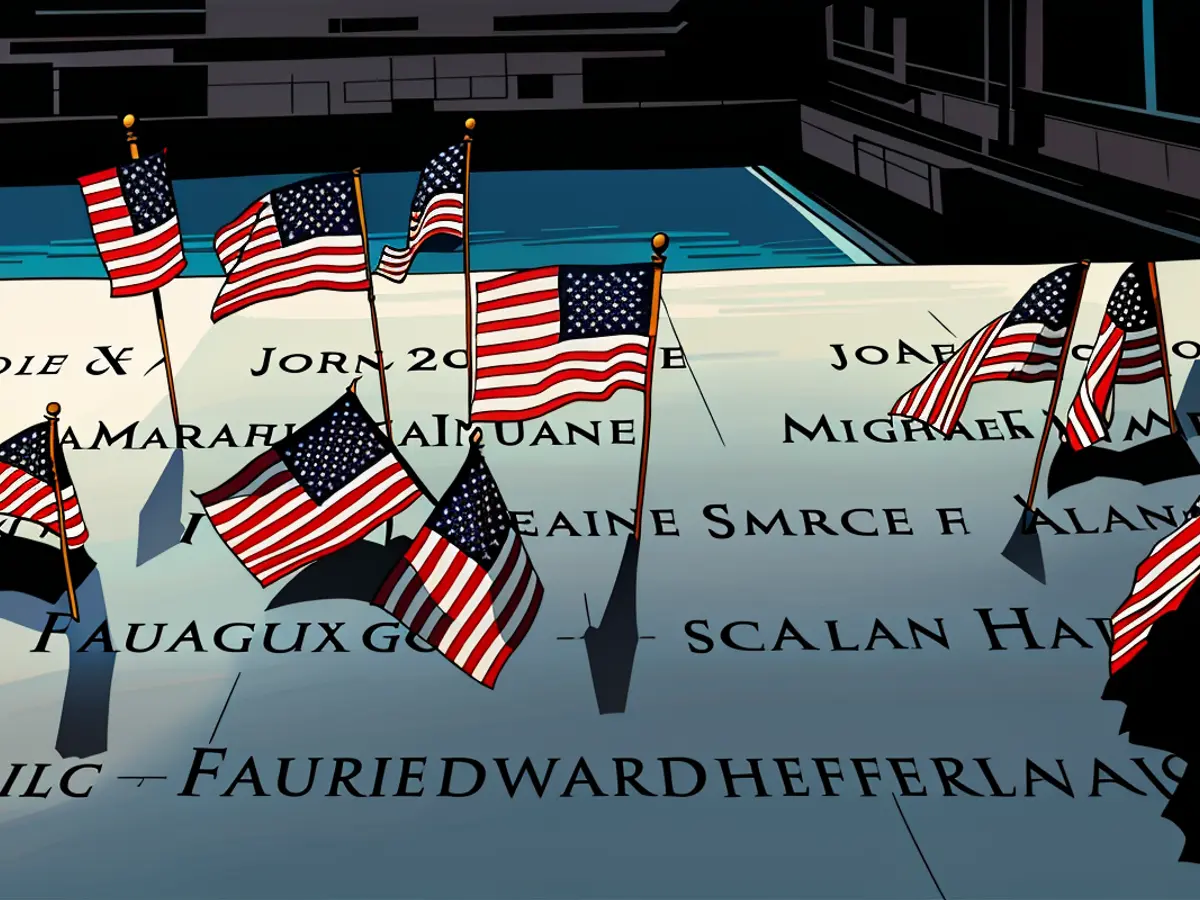Over two decades after the September 11 attacks, relatives of the victims persist in their pursuit of accountability from Saudi Arabia through a civil court case.
For the countless families who feel vital details have been concealed surrounding the incident that claimed their dear ones' lives, this phrase is more of an everyday reality than something spoken aloud.
As these survivors and family members honor another anniversary, they anticipate a federal judge's crucial decision in their lengthy legal dispute with the Kingdom of Saudi Arabia over their allegation of KSA's involvement in fostering an extremist assistance network that aided the hijackers in the United States prior to the September 11, 2001, attacks on the World Trade Center and the Pentagon. The Kingdom denies the accusations.
Terry Strada, the national chair of 9/11 Families United, a group consisting of victims' families and survivors advocating for transparency, considers "Never Forget" a perpetual reminder to pursue the truth regarding the tragedy that led to the deaths of her husband and nearly 3,000 others, to secure a safer nation for future generations of her grandchildren.
“It’s not simply a yearly occasion to remember those who perished or were murdered that day. It’s a commitment to ensure that the truth is unveiled,” Strada told CNN. “There’s so much more to it than just never forgetting them. It’s never forgetting what occurred so we can prevent it from happening again.”
During a hearing in July regarding Saudi Arabia's motion to dismiss the case, lawyers for the families presented evidence they claim exposes a support network involving high-ranking Saudi officials working in the United States – some even within the embassy in Washington, D.C. – that facilitated the hijackers' travels across the country.
Plaintiff attorney Gavin Simpson stated during the July 31 hearing that this covert, militant network with an “anti-United-States mission,” was "created, funded, directed and supported by the Kingdom of Saudi Arabia and its affiliated organizations and diplomatic personnel within [the] United States."
15 of the 19 hijackers were Saudi citizens, but Saudi Arabia has continuously denied any government involvement in the attacks. The United States has consistently asserted that its strategic Middle East ally played no role, and that al Qaeda acted independently in hijacking four commercial airplanes and crashing them into the Twin Towers in New York City and the Pentagon. A fourth plane, United Flight 93, crashed in Pennsylvania.
However, allegations of Saudi complicity continue to surge. The litigation against Saudi Arabia has evolved since 2002. In 2016, Congress overruled then-President Barack Obama's veto to enact a law allowing individuals to sue foreign governments for terror attacks, enabling the families' claims against Saudi Arabia to proceed.
Thousands of lawsuits seeking compensation from Saudi Arabia for allegedly providing material and financial assistance to al Qaeda have been consolidated into a multi-district litigation being overseen by a federal district judge in Manhattan.
In 2018, federal District Judge George Daniels granted a limited opportunity for the families' attorneys to pursue discovery related to a supposed terror cell run by two key players operating around Los Angeles and San Diego. The plaintiffs' attorneys must establish that these two Saudi nationals supported the hijackers as agents for Saudi Arabia under the direction of more senior Saudi officials.
If Daniels rules that the case can proceed, it may result in previously unseen evidence being made public.
The arguments in July outlined evidence compiled through years of gradual disclosures from the Department of Justice, the Metropolitan Police Service in the U.K., and the Kingdom, including recently disclosed information.
Lawyers for the plaintiffs pointed to two Saudi nationals endorsed by the Kingdom as spearheading a Southern California-based terror cell that supported two of the 9/11 hijackers, Nawaf al Hazmi and Khalid al Mihdhar, upon their arrival in the United States in 2000 before eventually crashing American Airlines Flight 77 into the Pentagon.
A Saudi diplomat, Fahad Al Thumairy, stationed in the Saudi consulate in Los Angeles, is said to have served as the primary liaison individual for al Qaeda and the hijackers in Los Angeles, according to the plaintiffs' court filings.
Focus on a student who aided two hijackers
Thumairy worked closely with another important figure in the litigation, Omar al-Bayoumi, in orchestrating the support system for Hazmi and Mihdhar during their time in California before their eventual relocation to continue the terror plot, according to the court filings.
Bayoumi – who was sponsored by the Kingdom as a student living in the United States and had a job with a Saudi contractor – aided the two hijackers upon their arrival in the country, according to the 2004 9/11 Commission Report. He assisted them in finding a San Diego apartment, opening a bank account, and co-signing their lease, according to the report at the time.
Information later released by the FBI supported the plaintiffs' claim that Bayoumi and Thumairy orchestrated the support network in Southern California for Hazmi and Mihdhar at the direction of more senior Saudi officials working with known extremists including American-born al Qaeda propagandist Anwar al-Awlaki, who was eventually killed in an American drone strike in 2011, Simpson highlighted at the hearing.
However, the 2004 report stated at the time that there was no evidence to suggest that Bayoumi had knowingly aided the hijackers. FBI findings regarding his alleged Saudi intelligence connection were not publicly released until more than a decade later.
Saudi Arabia maintains that Bayoumi was a student who was deeply involved with a San Diego mosque, and whose congregants unknowingly assisted the hijackers out of mere kindness and hospitality towards the newcomers that did not speak English.
During the July trial, while defending the case to dismiss the lawsuit, Saudi Arabia's legal representative, Michael Kellogg, primarily focused on Bayoumi's role, stating any support he provided to the hijackers was "limited and entirely innocent." Kellogg relied on Bayoumi's 2021 deposition, interactions with law enforcement, and the 9/11 Commission report to substantiate his arguments.
Attorneys for Saudi Arabia accused the plaintiffs of being misguided by concentrating on Bayoumi, labeling their theories as "progressively far-fetched."
According to evidence presented by the plaintiffs, Bayoumi met with a Saudi diplomat at the consulate before encountering the hijackers for the first time at a restaurant in Los Angeles two weeks after their arrival in California. Bayoumi helped the hijackers relocate from L.A. to San Diego shortly after their initial meeting.
Saudi Arabia's legal team claimed Bayoumi encountered the hijackers in a random encounter at a halal restaurant near a famous mosque in 2000 and only had "limited interactions" with them afterwards. They also noted that there was no proof Thumairy had assisted the men, although the 9/11 families' attorneys presented FBI findings indicating Thumairy had delegated a mosque member to pick up the hijackers from the airport and bring them to Thumairy when they initially arrived in Los Angeles in January 2000.

During the remote deposition of 2021, Bayoumi conceded to helping Hazmi and Mihdhar settle in San Diego but asserted his absence from the attacks.
Allegedly residing in Saudi Arabia, Bayoumi could not be reached for comment by CNN. The Saudi embassy in the U.S. has not provided a statement in response to CNN's inquiry.
Crucial video at the heart of the lawsuit
Evidence shown in court included public materials provided to the plaintiffs by the Metropolitan Police Service, which had searched Bayoumi's UK home following the 9/11 attacks.
This included footage from a party Bayoumi hosted two weeks after the hijackers arrived in San Diego – a party the plaintiffs' attorneys contended was meant to welcome the hijackers, bless their mission, and introduce them to their support network. Simpson referred to Bayoumi as the "main host" of the party in the newly released footage from the gathering, which also depicted the hijackers assisting Bayoumi in hosting the event.
Previously, the 9/11 Commission Report had mentioned the party, but Simpson claimed the report failed to adequately analyze the Arabic conversations. The plaintiffs have now identified all 29 men present in the party footage, Simpson revealed during the hearing – the 9/11 Commission Report had only named five individuals who attended the gathering.
In their investigation, the plaintiffs' attorneys found that Saudi officials and other radical individuals were shown in the footage of the gathering.
Additional footage released in June through the lawsuit, originally aired by CBS News and shared with CNN by the plaintiffs, depicted Bayoumi filming around Washington, D.C., over several days in 1999. The plaintiffs claim this footage showcases a covert surveillance mission targeting the US Capitol building entrances and exits.
Authorities have long suspected that the Capitol might have been a target for United Flight 93, which crashed in Pennsylvania on September 11.
Lawyers for Saudi Arabia argued in court that Bayoumi was only a tourist visiting the Capitol during his holiday when he filmed his tour.
During the hearing, Judge Daniels questioned a defense attorney about the Bayoumi footage, which included Bayoumi saying, "These are the demons of the White House." One Saudi attorney called the statement "regrettable," suggesting it was taken out of context. However, Judge Daniels remarked that such a statement was not typical speech from a tourist visiting a "beautiful building."
The footage from the party and Bayoumi's alleged Capitol surveillance were recovered from a trove of video and documents seized at a UK residence Bayoumi owned just after the 9/11 attacks, according to plaintiff court filings. The plaintiffs obtained the evidence from the UK's Metropolitan Police Service in response to a discovery order in this case in 2022 and 2023.
Plaintiffs' attorneys have outlined alleged frequent phone calls between Bayoumi and Saudi officials, particularly during the moments he aided Hazmi and Mihdhar, using a contact book seized from Bayoumi's residence by the Metropolitan Police Service. This handwritten book, which has been made public in the litigation, contains information for over 100 Saudi government officials, Simpson declared in court. If Bayoumi was really just a student and a contractor's accountant for the Saudis, he wouldn't have interacted with such high-level Saudi officials mentioned in the book, the plaintiffs claim.
Saudi Arabia's legal team attributed some of the contacts to Bayoumi's volunteer work at a San Diego mosque and challenged the admissibility of the contact book as evidence, arguing the plaintiffs cannot prove the book was created by Bayoumi within the scope of his duties for Saudi Arabia.
The military prosecutor's office sent an email notification to family members prior to announcing mitigating plea deals that would sidestep a complicated trial in public.
Numerous family members of the victims discovered these deals following a lengthy session in a New York federal courtroom, where devices are seized upon entry. This courtroom was the venue for a lawsuit involving the Kingdom of Saudi Arabia.
Upon leaving the courthouse in downtown Manhattan, Strada felt abruptly disheartened.
Merely two days later, Defense Secretary Lloyd Austin abruptly rescinded the plea agreements through an unanticipated memo disseminated by the Pentagon on a weekend evening. Austin claimed that "the responsibility for making such a decision should rest with me."
In the memo, Austin revoked the power to enter into any plea agreements from Susan Escallier, the figure with the authority to convene military commissions within Guantanamo, thereby retaining "such authority for himself."
Legal experts now contend that Austin's reversal of the agreements was unlawful, and counsel for KSM and the other two accused individuals are contesting this action in court.
As these proceedings drag on, the aftermath of the sudden change of the plea agreements leaves Strada and other family members of the victims waiting justly for more than two decades, hoping that the lawsuit against the Kingdom of Saudi Arabia will ultimately yield results.
Strada hopes that holding the Saudi government to account through this litigation will serve as a stark reminder to the world. She explained to CNN that, "I hope it sends a really powerful message to the world that if you attack Americans on US soil, we will hold you accountable in a US court."
- Despite the ongoing legal dispute, Terry Strada, who represents 9/11 Families United, continues to urge for transparency, stating, "We must never forget that it's not just about remembering those who perished, but also ensuring the truth is revealed and preventing such tragedies from happening again."
- In their pursuit of justice, the families affected by the 9/11 attacks, including Strada, are united in their belief that the US and its strategic Middle East ally, Saudi Arabia, should cooperate fully in exposing any potential involvement in the attacks, as they believe that over 15 of the 19 hijackers were Saudi citizens.









